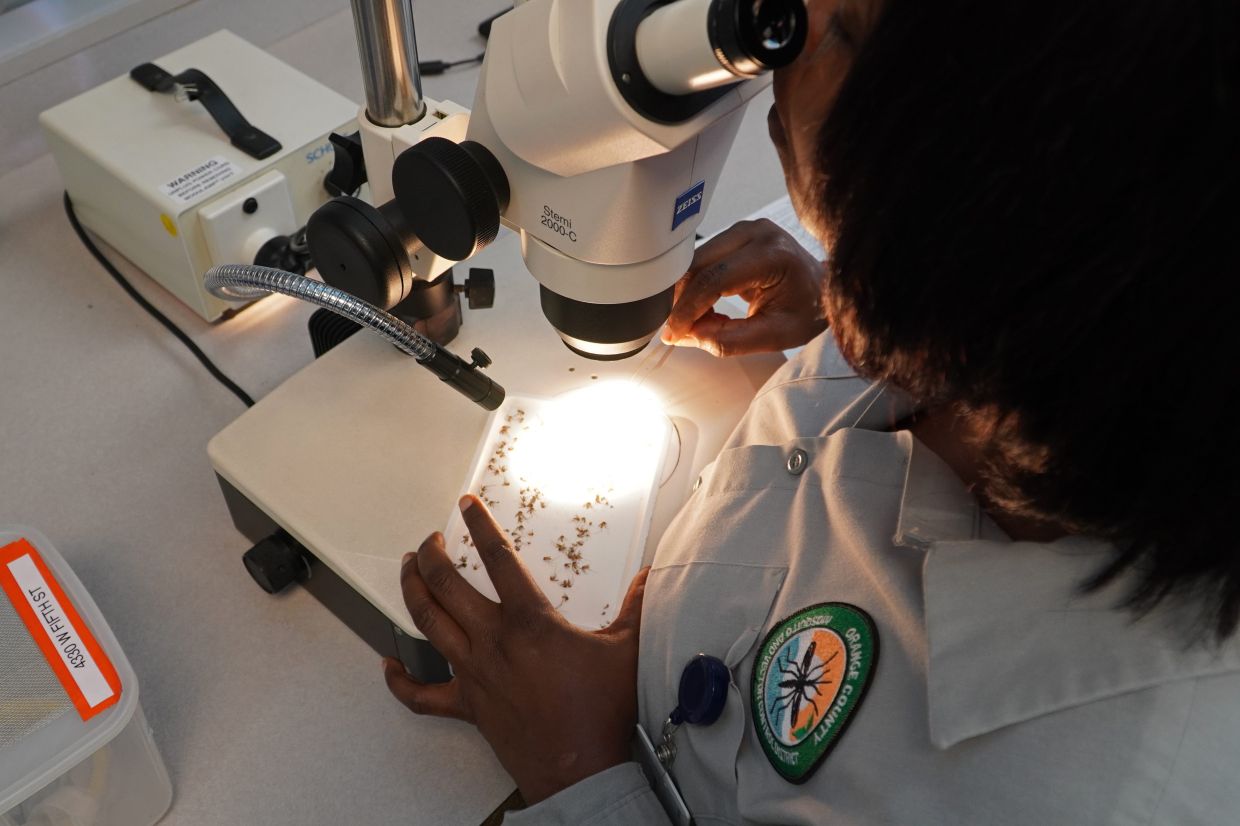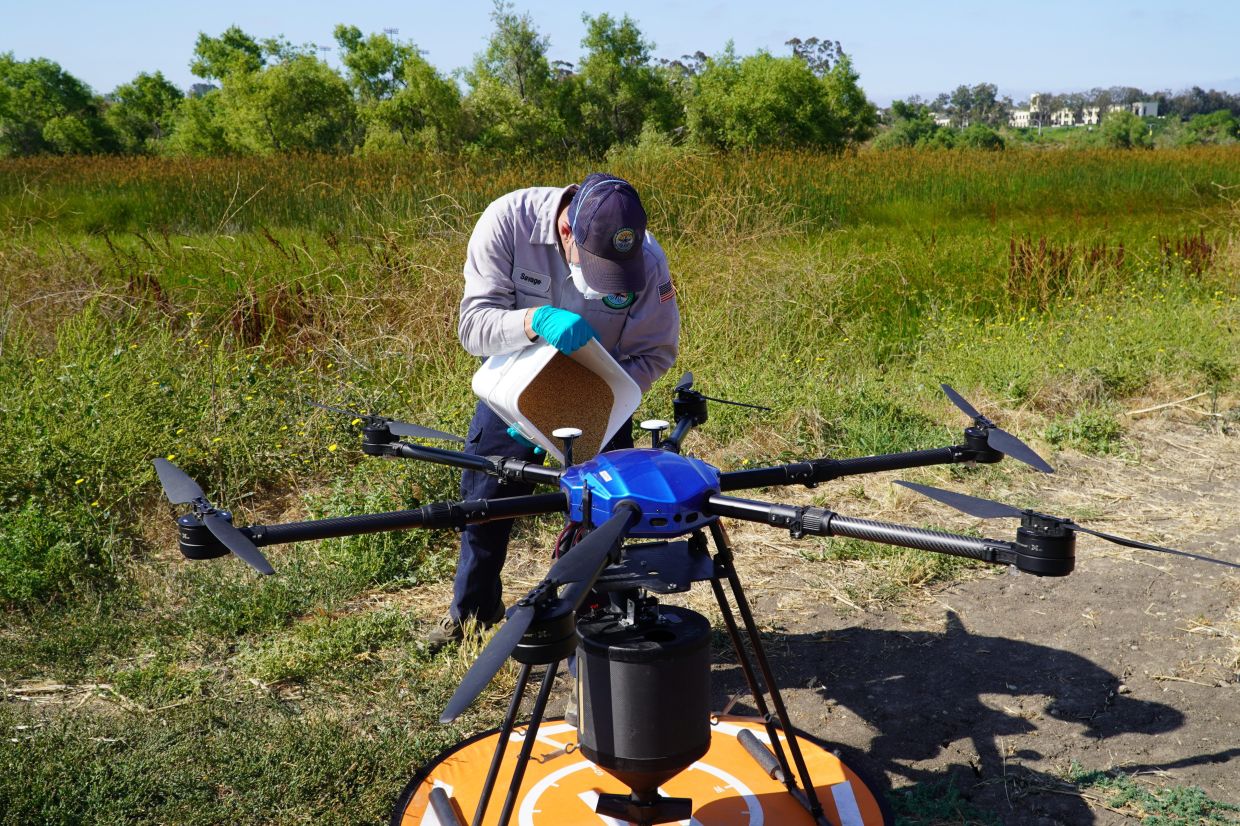
Drone pilot John Savage loads a hexacopter drone with anti-mosquito bacterial spore pellets at the San Joaquin Marsh Reserve at University of California in Irvine, California. The drone is the latest technology deployed by the Orange County Mosquito and Vector Control District to attack mosquitoes developing in marshes, wetlands, large ponds and parks. — AP
IRVINE, California: A drone flies over a peaceful Southern California marsh and unleashes a rain of larvae-killing bacterial spore pellets. Its target: a surging population of mosquitoes that can spread diseases to humans.
The drone is the latest technology deployed by the Orange County Mosquito and Vector Control District to attack mosquito development in marshes, large ponds and parks.
Mosquitoes grow into larvae from eggs laid in water, making proliferation of the biting bugs a major concern after California's extraordinarily rainy winter.
“There’s quite a bit more mosquitoes due to the rain,” said John Savage, who recently operated the drone at San Joaquin Marsh Reserve near the University of California, Irvine. “You can see out here almost every single marsh pond is full of water.”
The district sprawling over more than 800 square miles (2,070 square kilometers) south of Los Angeles is reporting that traps are capturing three times the 15-year average number of mosquitoes.
“I would call it a huge spike,” said Kiet Nguyen, a vector ecologist for the district.
Common methods of applying anti-mosquito treatments involve use of backpack sprayers, trucks, airplanes and helicopters. The drone allows more precise treatments and avoids the need to trample through sensitive lands, according to the district.
“We’re always looking for advancements in technology – what can get the job (done) more efficient, more beneficial to the team and less invasive,” Nguyen said.
The drone is flown higher than all nesting birds and allows access to places that can’t be reached by a person with a backpack sprayer or trucks, Nguyen said.
Nguyen said the drone is able to treat 1 acre (0.4 hectares) of land in under two minutes, a task that would take more than an hour of hiking by a worker with a backpack.
As Savage finished a recent morning flight, a nearby great egret was undisturbed as it searched the tall grasses for food.
“We’ve done studies where we watched the birds,” said Savage, “And the birds usually come right back after the drone passes over. So if anything, it’s better for the environment.”
The anti-mosquito treatment is not harmful to other wildlife.
“The mosquito larvae are filter feeders, so they feed on the bacteria,” Savage said. “It enters their gut and it’s a growth regulator. So essentially – if you guys have seen the movie Alien – it blows their stomach out.”
According to the district, the drone operators must have a US Federal Aviation Administration remote pilot license as well as a California Department of Pesticide Regulation unmanned aircraft vector control technician license.
The Orange County district, which acquired its drone several years ago, does not use it in neighbourhoods. Similarly, Santa Clara County Vector Control uses a drone to control mosquito larvae in nonresidential areas along San Francisco Bay.
Mosquito-borne diseases have long been recognised as a public health threat, and the concern is rising.
The European Union’s disease prevention authority warned this month that warming caused by climate change is raising the risk of mosquito-borne viral diseases. And this week, the US Centers for Disease Control and Prevention reported five cases of malaria spread by mosquitoes in Florida and Texas, marking the first local spread in 20 years.
In California, West Nile virus is the most common and serious mosquito-borne disease, accounting for more than 7,500 human cases and more than 300 deaths since 2003, according to the state Department of Public Health.
So far this year, West Nile has not been detected in the Orange County district but Nguyen is nowhere near declaring victory over the pests.
“It’s more of a battle,” he said. “You’re not going to win the war against mosquitoes, but you can gain some ground. And with advancements in technology, we’re gaining ground.” – AP















































